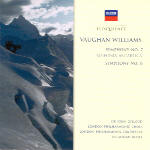There’s little that need detain us here: Adrian Boult rerecorded both symphonies for EMI in the 1960s, in excellent sound with a much more polished London Philharmonic. This Eighth, in particular, doesn’t hold a candle to the later effort, not to mention Barbirolli’s world-premiere recording recently reissued in excellent stereo sound on Dutton. Although some of Boult’s earlier RVW recordings (especially Symphonies 4 and 6) retain their value on account of their fleeter tempos and sharper accents, these two late works rely for much of their impact on sheer color, something relatively absent in these gray-sounding performances. Compare, for instance, the Eighth’s finale or the Seventh’s glacial third movement, both of which rely heavily on “sound effects” from tuned percussion, celesta, harps, and (in the Seventh) organ. Certainly there’s no doubt about Boult’s authority in this repertoire, and in their day these renditions may have been satisfactory; but collectors now have the luxury of choice, and that happy fact gains these honorable but unspectacular efforts a well-earned retirement.
































